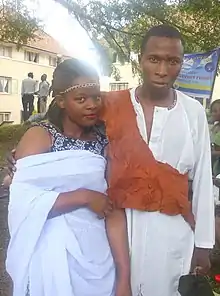Abatooro | |
|---|---|
 | |
| Total population | |
| 810,708[1][2] | |
| Regions with significant populations | |
| Languages | |
| Rutooro and English | |
| Religion | |
| Christianity, Tooro Religion, Islam[3] | |
| Related ethnic groups | |
| other Rutara people (Banyoro, Banyankole, Bakiga, Bahema, Bahaya and Baruuli) |
| Tooro | |
|---|---|
| Person | Omutooro |
| People | Abatooro |
| Language | Orutooro |
| Country | Obukama bwa Tooro |
The Tooro people (/ˈtɔːroʊ/, Abatooro, IPA: [aβatóːɾo]), also known as Batooro or Toro people are a Bantu ethnic group, native to the Tooro Kingdom, a subnational constitutional monarchy within Uganda.[4][5][6]
Religion
According to the 2002 Census of Uganda 48.8% of Batoro are Roman Catholic, 30.8% are Anglican (Church of Uganda), 7.3% follow other religions and 5.4% are Muslim and 5.2% are Pentecostal.[7][8][9][10]
Population
As of December 2014 the following administrative districts constitute the Tooro Kingdom: (a) Kabarole District (b) Kamwenge District (c) Kyegegwa District and (d) Kyenjojo District. Those four districts had a combined total population of about 1 million people, according to the 2002 national population census.[11]
Clans
Tooro people are divided into individual clans, and most Tooro clans have a totem which spiritually represents them.
Culture
Since Fort Portal Tourism city is the headquarter of Tooro Kingdom, the area has two inscribed elements of Empaako[12] and Koogere oral traditions[13] on UNESCO's list of Intangible Cultural Heritage in Need of Urgent Safeguarding. The Tooro cultural dance is called “Kinyege” [14][15]
Prominent people
The following individuals are some of the prominent Batooro:
- Elizabeth Bagaya - She is a lawyer, politician, diplomat, model and actress. She was the first female East African to be admitted to the English Bar. She is a paternal aunt of the current Omukama of Tooro, Oyo Nyimba Kabamba Iguru Rukidi IV.
- Edward Bitanywaine Rugumayo - He is a politician, diplomat, author, academic and environmentalist. Current University Chancellor of Kampala University and of Mountains of the Moon University
- Brigadier Nobel Mayombo (1965–2007) - He was military officer in the UPDF and a Member of Parliament (MP).
- Andrew Mwenda - Journalist and entrepreneur. Founder and owner of The Independent, a current affairs newsmagazine.
- Brigadier Kayanja Muhanga - He is an army officer. He currently serves as the Commander of the UPDF Contingent in South Sudan. He was appointed to that position in January 2014 by General Yoweri Museveni, the Commander in Chief of the UPDF and the President of Uganda.[16]
- Professor John Ntambirweki - A lawyer, academic and academic administrator. He is the current Vice Chancellor of Uganda Pentecostal University, a private university, located in Fort Portal, Western Uganda.
- Dr. Godfrey Bahiigwa - Economist and entrepreneur. Director of Agriculture and Rural Development at the African Union Commission in Addis Ababa, Ethiopia.
See also
References
- ↑ "Uganda". World Directory of Minorities and Indigenous Peoples. 19 June 2015.
- ↑ Uganda Bureau of Statistics. "National Population and Housing Census 2014 - Main Report" (PDF).
- ↑ "Population Composition" (PDF). ubos.org. Retrieved 7 August 2023.
- ↑ Toro Kingdom. "The People of Toro". Torokingdom.org. Retrieved 9 December 2014.
- ↑ "Toro | History, Culture & Traditions | Britannica". www.britannica.com. Retrieved 2024-01-12.
- ↑ bwindigorilla. "batooro traditional dance | Africa Safari Guide". Bwindi Forest National Park. Retrieved 2024-01-12.
- ↑ "Population Composition" (PDF). ubos.org. Retrieved 7 August 2023.
- ↑ "The spread of Catholicism in Tooro from 1895 -1961". Monitor. 2022-06-03. Retrieved 2024-01-12.
- ↑ Project, Joshua. "Batooro in Uganda". joshuaproject.net. Retrieved 2024-01-12.
- ↑ "History of Tooro". Kitara Foundation for Regional Tourism. 2020-05-21. Retrieved 2024-01-12.
- ↑ UBOS (August 2013). "2013 Statistical Abstract. Includes Corrected 2002 Census Data By District" (PDF). Uganda Bureau of Statistics (UBOS). Retrieved 9 December 2014.
- ↑ "UNESCO - Empaako tradition of the Batooro, Banyoro, Batuku, Batagwenda and Banyabindi of western Uganda".
- ↑ "UNESCO - Koogere oral tradition of the Basongora, Banyabindi and Batooro peoples".
- ↑ tubayo.com https://tubayo.com/experience/5f69ace6b864b9004ae8bbf6. Retrieved 2024-01-12.
{{cite web}}: Missing or empty|title=(help) - ↑ "Runyege, Tooro's energetic dance". Monitor. 2021-01-04. Retrieved 2024-01-12.
- ↑ Administrator (10 February 2014). "Colonel Kayanja Promoted to Rank of Brigadier". The Independent (Uganda). Retrieved 9 December 2014.